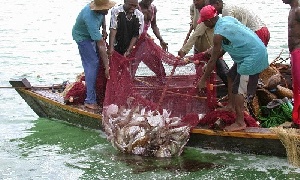Mr Kofi Agbogah, the Director of Hen Mpoano, has said there is the need for reforms in the fisheries sector to ensure sustainable development and food security.
He said this requires transparency, participation and accountability by all stakeholders in the sector.
Speaking over the weekend at a workshop held to discuss challenges in the fishing sector, Mr Agbogah said the fisheries sector should be seen as an extractive industry whose renewable natural resources could be exhausted.
The event was held under the theme: Towards consensus building –improved fisheries governance in GHEITI.
Participants at the two-day Friedrich-Erbert-Stiftung sponsored workshop included various members of the Industrial Trawlers Association; Ghana National Canoe Fishermen Council; Inland Canoe Fishermen Council; Ghana National Fish Traders and Processors, amongst others.
Discussing the topic: Contemporary challenges in the fisheries sector demanding transparency and accountability, Mr Agbogah said it is imperative that Ghana signs and joins on the Fisheries Transparency Initiative (FiTI).
Mr Agbogah said the purpose of FiTI is to “increase transparency and participation in fisheries governance for the benefit of a more sustainable management of marine fisheries.
He said there is the urgent need for transparency in the sector to address the perennial concerns of: fisheries data collection and reporting; FC board composition; vessel ownership and licensing concerns; the Fisheries Development Fund; and the pervasive illegal transshipment concerns.
Mr Agbogah said the challenges in the fisheries sector include: political polarization and interferences; low empowerment of local leadership (chief fishermen); low engagement of fisher folks amongst others.
Mr Noble Wadza, an executive of Oilwatch-Ghana, said Government of Ghana signed on to the Extractive Industry Transparency Initiative (EITI) in 2003.
He said this became known as the GHEITI bill which is yet to be passed into law.
Mr Wadza said the fulcrum of this Initiative is to strengthen transparency and accountability in relation to revenue and payments from the extractive sector.
He said GHEITI which was initially introduced to the mining and oil and gas sector, has now been expanded to include the forestry and fishery sector.
Business News of Monday, 25 June 2018
Source: ghananewsagency.org
Urgent reforms are needed in the fisheries sector – Kofi Agbogah
Opinions












